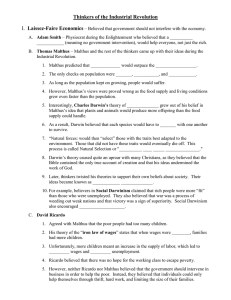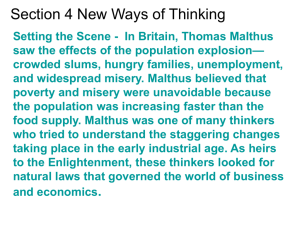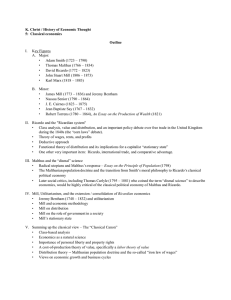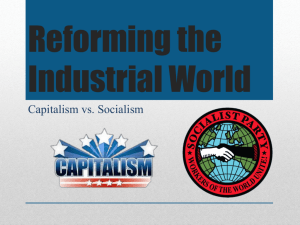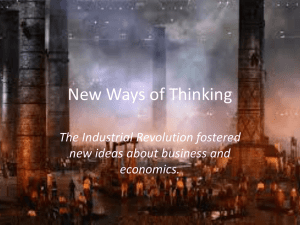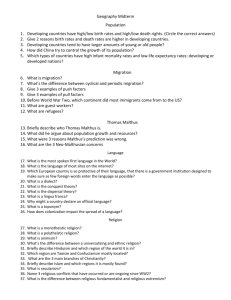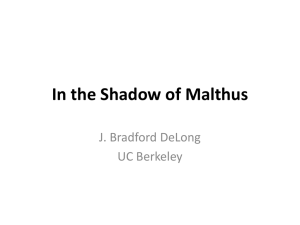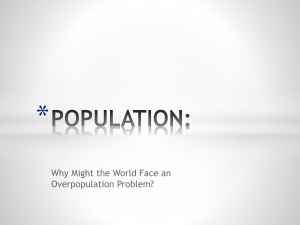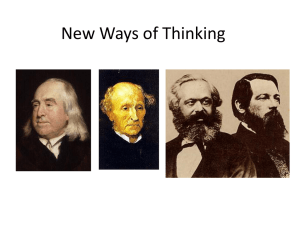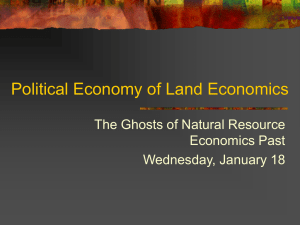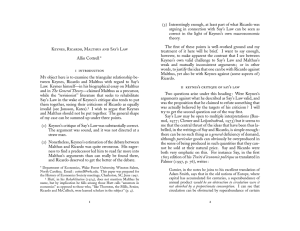7-4 New Ways of Thinking Presentation
advertisement
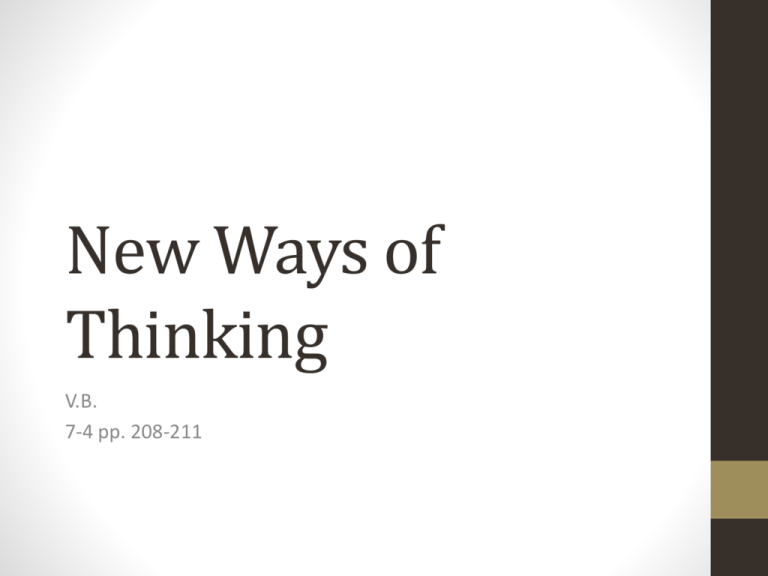
New Ways of Thinking V.B. 7-4 pp. 208-211 Setting the Scene • Everywhere in Britain, Thomas Malthus saw the effects of the population explosion- crowded slums, hungry families, unemployment and widespread misery. • In 1798 he published his “Essay on the Principle of Population.” In which he wrote “The power of population is far greater than the power of the Earth to produce subsistence for man.” • Malthus was one of the many thinkers who tried to understand the staggering changes taking place in the early industrial age. • As heirs to the Enlightenment, these thinkers looked for natural laws that governed the world of business and economics, Laissez-Faire Economics • During the Enlightenment, physiocrats argued that natural laws should be allowed to operate without interference. • As part of this philosophy, they believed that government should not interfere in the free operation of the economy. • In the early 1800s, middle-class business leaders embraced this laissez-faire, or “hands-off” approach Legacy of Adam Smith • The main prophet of laissez-faire economics was Adam Smith, author of The Wealth of Nations. • Smith asserted that a free market- the unregulated exchange of goods and services- would come to help everyone, not just the rich. • Supporters of this free-enterprise capitalism pointed to the successes of the industrial age, in which the government had played no part. Malthus on Population • Like Smith’s book Thomas Malthus writings on population shaped economic thinking for generations. • Malthus predicted that population would outpace food supply, the only checks on population growth were war, disease, and famine. • During the early 1800’s many accepted Malthus’s bleak view. It proved to be pessimistic. • By the 1900’s population growth was no longer a problem in the West, but it did continue to afflict many nations elsewhere. Ricardo on Wages • Another influential British economist, David Ricardo, agreed with Malthus that the poor had too many children. • In his “Iron law of wages” Ricardo pointed out that when wages were high, families had more children. • Like Malthus, Ricardo did not hold out hope for the working class to escape poverty. Because of such gloomy predictions, economics became known as the “dismal science.” • Both men opposed the government help for the poor. • To these supporters of laissez-faire economics, the best cure for poverty was not government relief but the unrestricted “laws of the free market.” The Utilitarians • By 1800 Jeremy Bentham was preaching utilitarianism, the idea that the goal of society should be “the greatest happiness for the greatest number” of its citizens. • To Bentham, all laws or actions should be judged by their “utility”. • Bentham’s chief follower, John Stuart Mill, also argued that actions are right if they promote happiness and wrong if they cause pain. • He reexamined the idea that unrestricted competition in the free market was always good. • Mill further called for giving the vote to workers and women. • Most middle-class people rejected his ideas. Emergence of Socialism • While the champions of laissez-faire economics praised individual rights other thinkers focused on the good of society in general. • To end poverty and injustice, the offered a radical solutionsocialism. • Under socialism, the people as a whole rather than private individuals would own and operate the means of productionfarms, factories, railways, and other large businesses that produced and distributed goods. • In a socialist society, one reformer predicted: • “There will be no war, no crime, no administration of justice, as it is called, no government. Besides there will be neither disease, anguish, melancholy, nor resentment. Every man will seek… the good of all.” -William Godwin. The Utopians • Early socialists tried to build self- sufficient communities in which all work was shared and all property was owned in common. • When there was no difference between rich and poor, they felt, fighting between people would disappear • These early socialists were called Utopians, after Thomas More’s ideal community • The name implied that they were impractical dreamers • However, the Utopian Robert Owen did set up a model community to put his ideas into practice Robert Owen • A poor Welsh boy, Owen became a successful mill owner. • Unlike most industrialists at the time he refused to use child labor. • Owen insisted that the conditions in which people lived shaped their character • To prove his point, he set up his factory in New Lanark, Scotland. • He built homes for workers, opened a school for children, and generally treated employees well. • He showed that an employer could offer decent living and working conditions and still run a profitable business
